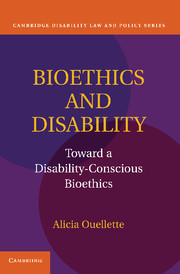1 - The Struggle: Disability Rights versus Bioethics
Published online by Cambridge University Press: 07 June 2011
Summary
A disability rights activist once charged, “if i were listing the most dangerous people in the U.S. today, bioethicists, aka medical ethicists, would top my list – way above skinheads, whose beliefs they appear to share.” A different activist testified in a hearing on health reform that the bioethics think tank, the Hastings Center, and the “movement for bioethics … directly continue the eugenics movement that organized Hitler's killing of patients, and other costly and supposedly unworthy people.” The activists' sentiments are not unusual. For the last three decades, an escalating conflict has pitted disability rights activists against bioethics. Despite a common interest in facilitating good medical care, disability rights activists and bioethicists differ sharply in their approach to such issues as how to treat newborns with disabilities, the stunting of growth in children with disabilities, and the removal of life support from patients in persistent vegetative states. These differences manifest in political action, disruptive protests launched at scholarly meetings, and in scholarly papers deeming bioethics “a disabling project.”
The fact of conflict between members of the disability rights and bioethics communities is at the same time surprising and predictable. On the one hand, both bioethics and disabilities studies are disciplines that share a common core commitment to respect for persons and ethical and fair medical decision making. On the other hand, disability experts often approach the same issues from a very different perspective than that of bioethicists.
- Type
- Chapter
- Information
- Bioethics and DisabilityToward a Disability-Conscious Bioethics, pp. 12 - 46Publisher: Cambridge University PressPrint publication year: 2011



